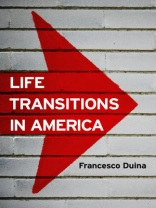We celebrate, talk about, and worry a great deal about transitions
in life. Going to college, having a first child, losing a job, and
retiring constitute just a few of the pivotal moments in the lives
of many. Sociologists and psychologists have devoted considerable
attention to life transitions. Yet we know very little about
whether there exists a common thread to our understandings of life
transitions in general. How do journalists, leading politicians,
sport icons, bestselling authors, government agencies, Hallmark
cards, popular TV shows, and other ‘voices’ of popular
culture talk about transitions in life? Do these voices provide a
coherent picture of how we make sense of life transitions?
In this book, Francesco Duina shows how the dominant American
discourse articulates two basic approaches to transitions in life.
The first approach depicts transitions as exciting, individualistic
opportunities for new beginnings: the past is cast aside, the
future is wide open, and the self has the opportunity to recreate
itself anew. The second paints transitions as having to do with
continuity, our connections to others, and the life-cycle, with an
emphasis on acceptance and adaptation. Though contrasting, the two
approaches ultimately complement each other. Their analysis reveals
a great deal about American culture and society, and will be of
great interest to students of the life course and the sociology of
culture.
Inhoudsopgave
Figures and Tables vi
Acknowledgments vii
I Introduction
1. Discourse and Transitions in Life 3
II Eight Transitions
2. Starting College 23
3. Getting Married 41
4. The First Child 62
5. Losing a Job 85
6. Surviving a Life-Threatening Disease 106
7. Divorce 125
8. Parents’ Death 143
9. Retirement 160
III Conclusion
10. Transitions in America 181
Appendix: Data Sources Overview 194
Notes 205
References 230
Index 255
Over de auteur
Francesco Duina is Professor and Head of Sociology at the University of British Columbia, Canada. He is also Visiting Professor in the Department of Business and Politics at the Copenhagen Business School in Denmark.












